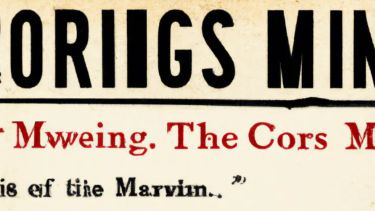AI Research Engineering
The CMI's AI Research Engineering (AIRE) team carry out leading-edge AI and machine learning research, working collaboratively across disciplines to develop standardized, open-source software solutions with potentially high impact.
The AIRE Mission
Working collaboratively with the University research community AIRE will:
assess and select proposals for AI/ML projects, analysing the requirements, feasibility, and impact
conduct leading-edge AI/ML research to address gaps and challenges
design, build, and deploy software libraries following FAIR principles (findability, accessibility, interoperability, and reusability)
disseminate research outcomes via high quality research publications, tutorial, hackathons etc.
Working with Special Interest Groups
The AIRE prioritizes interdisciplinary research projects which will result in potentially high impact. The AIRE invites proposals via the AI interest groups:
to encourage community engagement and interdisciplinary collaboration
to help researchers to find multiple partners from across disciplines
to help manage the process of project proposal and selection
to provide a "joined-up" approach to software development
To receive information on future AIRE project proposal calls and to be eligible to participate in AIRE projects sign up to our AI interest groups.
CMI and Research Software Engineering (RSE)
The CMI is also offering AI support for researchers across the university facilitated by the CMI-RSE team. This service will be more suitable for smaller scale, shorter, projects that are likely to involve less fundamental AI research.
Find out more about working with the CMI and the RSE
AIRE Current Projects
AI Brain Imaging for Nerve Pain Detection (UKRI funded)
Harnessing advanced AI technology to discern novel biomarkers, paving the way for enhanced chronic nerve pain treatments and revolutionising healthcare outcomes.
Prasun Tripathi, Dinesh Selvarajah, Jim Wild, Haiping Lu, Shuo Zhou, Solomon Tesfaye, David Bennett, Andrew Segerdahl, Leslie Colvin, Douglas Steele.
University of Sheffield: Faculty of Medicine, Dentistry and Health, Faculty of Engineering.
External Partners: University of Oxford, University of Dundee, AstraZeneca.
Text Correction for Historical Documents
Leveraging deep learning to refine OCR transcriptions of the extensive British Library Newspapers collection to overcome the barrier of inaccurate text data, unveiling a rich resource for exploring centuries of historical narratives and advancing global humanities research.
Alan Thomas, Robert Gaizauskas, Valeria Vitale, Michael Pidd, Robert Shoemaker, Haiping Lu.
University of Sheffield: Faculty of Arts & Humanities, Faculty of Engineering, Digital Humanities Institute (DHI).
External Partner: British Library.
Multimodal Cardiothoracic Disease Prediction
Utilising advanced AI to process multimodal cardiothoracic data for enhanced diagnosis and prognosis of Cardiothoracic Disease (CTD), paving the way for personalised medical care and transformative approaches in heart and lung health.
Mohammod Suvon, Andrew Swift, Venet Osmani, Samer Alabed, Pete Metherall, Shuo Zhou, Haiping Lu.
University of Sheffield: Faculty of Medicine, Dentistry and Health, Faculty of Social Science, and Faculty of Engineering.
External Partner: Sheffield Teaching Hospitals NHS Foundation Trust.
Multi-fidelity Fusion and Optimization Theory and Applications
Exploring innovative methods to optimize AI models using multi-fidelity data, aiming to enhance accuracy and efficiency across engineering disciplines by leveraging diverse data sources to improve model performance while reducing reliance on high-cost precision data.
Haolin Wang, Wei Xing, Donghwan Shin, Jose L. Casamayor, Haiping Lu
University of Sheffield Collaborating Faculties: Faculty of Science, Faculty of Engineering and AMRC
Using digital databases and advanced AI to predict new, sustainable materials for green technologies, accelerating the shift towards net-zero emissions and driving substantial progress in global sustainability initiatives.
Xianyuan Liu, Joshua Berry, Kathy Christofidou, Nicola Morley, Haiping Lu
University of Sheffield Collaborating Faculties: Faculty of Engineering, Royce Institute
Multimodal AI for Parkinson's Disease
Utilizing advanced artificial intelligence to process multimodal data to enhance the diagnosis and prognosis of Parkinson’s Disease, paving the way to uncover the underlying mechanisms of Parkinson’s Disease and improve its prediction.
Wenrui Fan, Thomas W. Payne, Mohammod Suvon, Xianyuan Liu, Mahjabin Islam, Haolin Wang, Jiayang Zhang, Venet Osmani, Chen Chen, Shuo Zhou, Oliver Bandmann, Haiping Lu
University of Sheffield Collaborating Faculties: Sheffield Institute for Translational Neuroscience (SITraN) and Faculty of Engineering
- Find out more about the AIRE team, projects and opportunities
- Meet the AIRE team on our people page
- Contact the AIRE team: aire-head-group@sheffield.ac.uk






